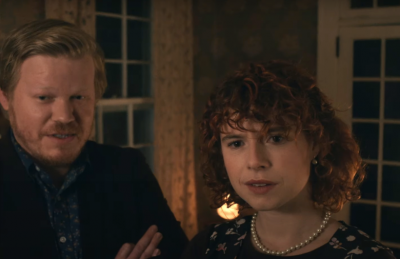

Charlie Kaufman is most definitely a filmmaker for happier times. Writer/director Kaufman’s films, like Being John Malkovich and Eternal Sunshine of the Spotless Mind, are explorations of the depths of human behavior, anxiety, depression and self-awareness, not exactly the kinds of films you look forward to when the world is burning. His latest film, I’m Thinking of Ending Things, is similarly dense and dark, with only a smattering of the offbeat comedy we have come to expect (and need) in his films. So why is it still the most memorable and worthy of watching, even now? Because sometimes, the best thing to offset the unreal is the surreal.
Ending Things, is similarly dense and dark, with only a smattering of the offbeat comedy we have come to expect (and need) in his films. So why is it still the most memorable and worthy of watching, even now? Because sometimes, the best thing to offset the unreal is the surreal.
I’m Thinking of Ending Things, a brilliantly-posed title with two possible meanings, is a dark and methodically-paced story of a newly-dating couple, played by Jessie Buckley and Jesse Plemons, who take a winter-time drive to the countryside to visit his parents, played by Toni Collette and David Thewlis. During the drive, we hear the woman’s thoughts, as she contemplates breaking up with him. In between voiceovers, the couple engages in some of the most bizarrely boring yet curiously weird conversation, laying the atmospheric foundation of this film, which is, essentially, strange yet weirdly captivating.
Once the couple arrives at his parents’ house, the film begins its slow descent into something between a fever dream and a surrealist fantasy. It starts to jump around in different realities, blending memory with nightmare, the past with the future, as we desperately try to make sense of what we’re seeing. From here, the film gets only weirder as the girlfriend, who is as baffled as we are as to what’s going on, finally gets her boyfriend to agree it’s time to leave, but not before he insists on showing her his old high school. Once at the school, a gorgeously sad and cinematic sequence brings a denouement to everything we’ve experienced so far, a fitting and moving end to a true acid trip.
If it seems I haven’t told you much of anything about this movie, it’s because there’s nothing that can be easily described, at least not in any traditional way. It is extremely theatrical, in the sense that I could easily see it on a stage: four actors, dense dialogue, little action and intricate and delicate themes. It probably works best as a book, which it was, written by Iain Reid, as internal becomes external, and vice versa. Kaufman, like David Lynch, excels in blending the dream-like with the macabre, and plumbing the depths of the human psyche with a watercolor brush. Even though it feels theatrical and literary, Kaufman makes full use of cinematic techniques, especially production design, cinematography and score to build a house of cards of the mind, forcing you to question everything.
So much of this movie is open for interpretation. Kaufman doesn’t hand the audience anything, it has to work for every moment. The shifts in reality, the fantastical dream-like sequences, the mind-numbing boredom—these all are intended to challenge the viewer to dare to decipher each moment’s meaning within the much larger puzzle, and, by the end of the film, we are either left with everything we need to understand what he’s going for or as confused as we were at the start.
The ones that think they don’t get it will throw their arms up and walk away from the weirdness and the seeming randomness. The ones that do think they get it, however, will immerse themselves in the themes, the meanings of certain things, the bigger picture all the moments paint. But, even for those who think they get it, my bet is no two people will get the same thing from this movie. Much like Eternal Sunshine of the Spotless Mind, which is a movie that means so many different things to so many people, I’m Thinking of Ending Things might end up being a Rorschach test for your own psyche. How you interpret this movie might say more about you than the movie. And I have to tell you, I love that. Every now and then, it’s essential to have a movie that doesn’t follow the rules, that challenges your intellect and worldview and finds a way to get emotions to bubble up that you never knew you had.
What pairs with Kaufman’s dark and Lynchian randomness perfectly are the performances by all four actors, notably Buckley and Plemons, who prove themselves to be deeply nuanced performers. To find all the subtlety, the sorrow, the benign resentment and deep-seated regret in their characters, Buckley and Plemons are magnificently understated and moving. Plemons especially is able to create a character who is impossibly opaque, numbingly dispassionate, yet obviously covering up a simmering volcano of remorse and doubt.
I’m Thinking of Ending Things is most definitely not everyone’s cup of tea. But if you love the theatre, and you love weird movies that inspire long conversations about regret and the frailties of life, then Charlie Kaufman is right for you not just now but anytime—and this movie is your jam.
